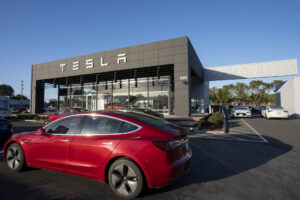Transition to electric vehicles (EVs)
Tesla is a global leader in EVs, which are beginning to replace internal combustion engine (ICE) vehicles as the product and charging infrastructure mature.
Pure battery EVs were 10-12% of worldwide new cars sold last year (NZ was approximately 12% by our estimates, excluding hybrids) but may reach 30% by 2030. For Tesla, it sold 1.3 million cars across Model S, 3, X & Y, equivalent to less than 2% of global new light vehicle sales.
Globally, there are around two billion vehicles on the road, and the transition from ICE will take decades. Tesla plans to expand production by 50% annually in the coming years as it sees substantial growth ahead. Commitments such as the 2035 ICE ban in Europe and NZ’s pledge to ban petrol and diesel vehicles between 2035 and 2040 will mandate the transition to zero emissions in wealthy countries.

Notably, Tesla is one of only a few profitable EV manufacturers on the market. It turned profitable in 2018/19 by producing high volumes of the Model 3, the first mass-market product at the firm. We view its EV production scale, profitability, brand, engineering focus, accumulated knowledge of batteries, and network of superchargers as a competitive edge over most other carmakers.
More than just cars
The vision at Tesla is to design sustainable systems that are massively scalable – resulting in the greatest environmental benefit possible. Besides light vehicles, Tesla also develops solar panels, large batteries for energy storage for home and utility grids, heavy-duty trucks, self-driving/autopilot systems, and even humanoid robots. Some of these are already commercial and profitable, such as solar and energy storage; some are longer-term, such as full self-driving, which has the potential to radically change how we travel.
The underlying thread is that Tesla is purpose-driven, has in-house technology and manufacturing expertise, and tackles large markets.
A divisive name
Investors have divergent views on Tesla shares. Most agree on the EV transition, but the risk is overpaying for the stock. Tesla’s current market value capitalisation at NZ$1trillion (equivalent to 4x times NZ’s GDP), implies a 50 times price-to-earnings ratio versus 5 times for BMW or Mercedes. This reflects the market’s assessment of the long-term nature of Tesla’s opportunity compared with traditional carmakers that will face a decline in their current ICE profits while having to invest in EVs to survive.
As EV adoption accelerates, the “earnings cliff” for carmakers with no profitable EV models is drawing nearer; meanwhile, Tesla benefits from carbon credits and government incentives, such as EV purchase and battery production subsidies.
But there is always a bear case. In 2022, Tesla shares fell 65 per cent, and the company has cut prices in recent months, which has led the market to question the strength of customer demand. The negativity surrounding the stock compounded when Musk purchased the social media company Twitter, which many Tesla shareholders view as a distraction.
To draw on another topic du jour, here is what artificial intelligence-powered answer engine ChatGPT would add on the Tesla debate:
- Production and Delivery Targets: Tesla has faced challenges in meeting production and delivery targets for its electric vehicles, which has led to concerns about the company’s ability to scale its operations and become profitable in the long run.
- Competition: While Tesla was the first company to bring electric vehicles to the mass market, it now faces competition from established automakers as well as new entrants into the electric vehicle market. Some investors believe that Tesla’s market dominance is at risk, while others believe that the company’s brand and technology give it a competitive advantage.
- Elon Musk’s Tweets: Tesla’s CEO, Elon Musk, is known for his outspoken and sometimes controversial tweets. Some investors have expressed concern that Musk’s tweets could lead to regulatory or legal issues for the company.
Yet, after going through our research process that focuses on future leaders, the Global Select fund bought a small position in the company in early January as we judged that the opportunity was likely worth the risk. Tesla’s shares have since rallied 80 per cent. We took some profits recently and continue to monitor developments at Tesla.


